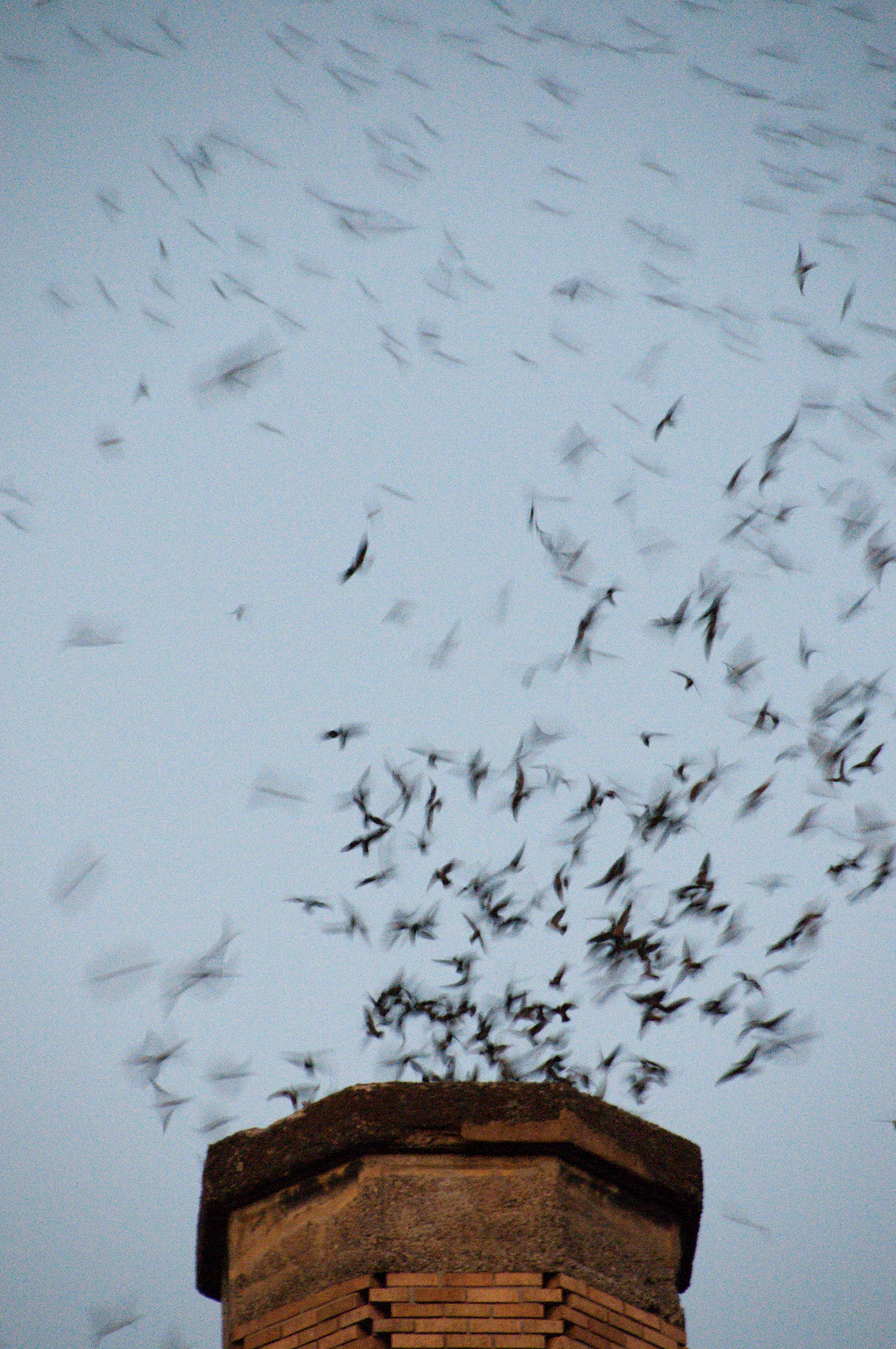Chimney swifts on Labour Day
A beautiful sign that fall is coming
“I wish we humans could be so cooperative,” said one of my neighbours as we watched the chimney swifts circling about the tall brick chimney, their home for the night. This is a sign that fall is coming. As the birds sank down into their chimney, so the pink and orange light fell out of the clouds, and the twilight became dark. Soon they will migrate to Peru.
To begin with, there were half a dozen birds or so. They flit and dart, making no noise. Over the next ten minutes, they are joined by dozens and dozens more, perhaps two hundred. Their flight becomes more patterned. They make loops and figures of eight. Sometimes they crowd above the tall chimney; sometimes they bulge away from it.
Occasionally, one or two birds dive into the chimney; mostly they circulate. At one point, they went so far away, we thought they might spend the night in a nearby chimney. The flock moves in a way that seems intentional, but it’s like watching Brownian motion. You cannot guess how they will be formed in the next few seconds.
Then comes the circle. All the birds, with more and more twittering, started rotating in a great “O”, wider at the top, as if imitating the shape of the Guggenheim Museum. Round and round the chimney they turn, tweeting more quickly. We chat about how this must be it, they must be about to go down.
Then they flex out, make more figures of eight, more wide flights away. Twice more this happens. And then the circle moves faster, tighter. They cohere. The descent begins just as the colour goes out of the evening light.
As they fall into the chimney, a little trickle at the bottom of the large funnel, it looks like a film being run backwards, of smoke escaping in reverse. The coordination required for a dozen birds to descend so closely to each other into the chimney without getting hurt is extraordinary. It almost feels like a visual trick.
The feat takes two or three minutes. And we are left with the remains of the evening. It was worth their prolonged efforts and communications. It can be 70° warmer inside the chimney than outside.
“I wonder if they have a leader,” said my neighbour who lamented the lack of human co-operation. Research suggests not. The birds fly by physical distance rules, maintaining a particular range from each other. These rules enable different sized groups. The higher the density, the larger the group can be.
Of course, the birds do not decide any of this. Swifts have no politics. They convene no forum, make no rules. They fly by instinct and coordinate locally. Order emerges spontaneously.
Watching the swifts, I was reminded of all the co-operation I have experienced in Arlington since I arrived three weeks ago. Neighbours arrive with dining chairs they went to pick up, having seen them going free in a Facebook group. One couple not only loaned us tools, but put up a curtain rail. Local children quickly organise to play games together.
Many of these kind people ask us what it is like to move here at this time. I see fewer of the police and soldiers than them. I am less aware of the news. But I do see people taking care of a community pool, leaving unwanted items in a collection spot for others, adopting kittens, passing on useful information.
When I go to restaurants, I think of all the human co-ordination it takes to make it possible for me to take a short bus ride and eat delicious Chinese food. I see this organic order at the library, on the metro, in the museums. Humans are indeed co-operative, often without planning it, without any leader. As Adam Smith wrote in The Wealth of Nations,
This division of labour, from which so many advantages are derived, is not originally the effect of any human wisdom, which foresees and intends that general opulence to which it gives occasion. It is the necessary, though very slow and gradual, consequence of a certain propensity in human nature, which has in view no such extensive utility; the propensity to truck, barter, and exchange one thing for another.
The spontaneous order of humans provides us with so much more than the swifts’ flight into the chimney. We are co-operating all day, every day, even when we are not aware of it. Even when we think the opposite is happening.
Happy Labour Day.



Bravo! This is an outstanding piece of prose.
One of the best things you’ve written. Really good. And I learnt about birds in flight too!